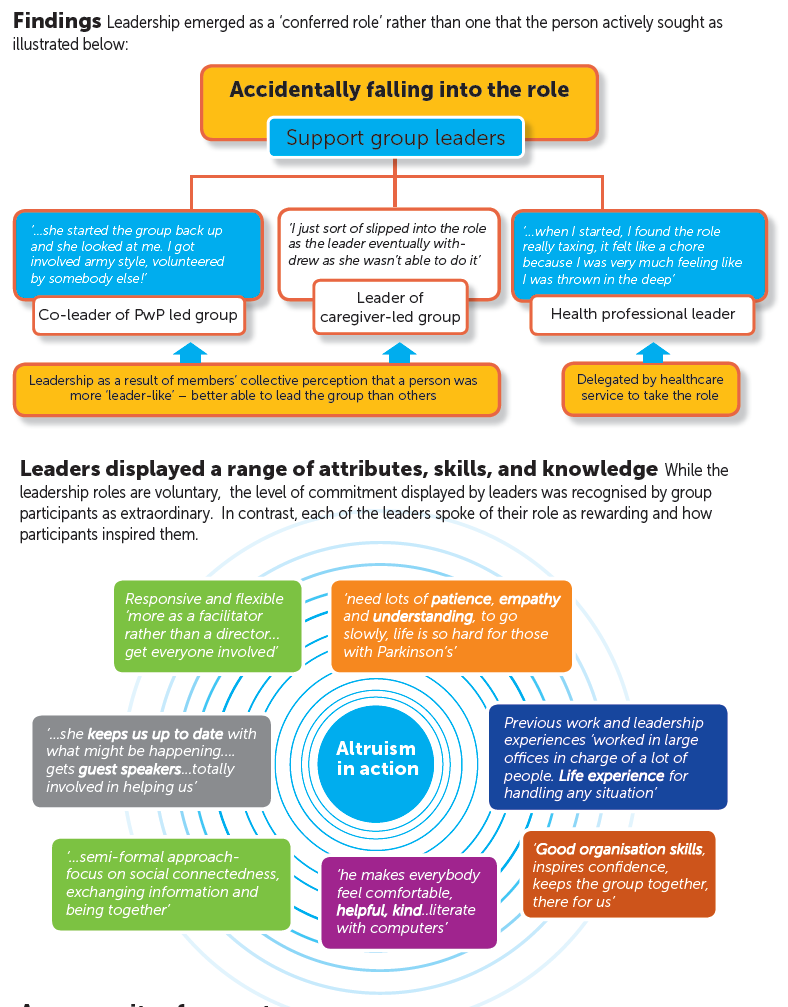Examining leadership of Parkinson’s disease support groups in rural and regional New South Wales
A qualitative descriptive case study
Author: Vincent Carroll
Co-authors: Rachel Rossier and Marguerite Bramble


A qualitative descriptive case study
Author: Vincent Carroll
Co-authors: Rachel Rossier and Marguerite Bramble
Parkinson’s NSW partnered with nursing researchers from Charles Sturt University to explore PD support group leadership to identify optimal models of leadership, further develop PNSW’s program for support group leaders to enhance their skills and knowledge; and identify strategies to support group leadership into the future.
Research Aimsii
iiCarroll, V. (2023). Examining leadership of Parkinson’s disease support groups in rural and regional New South Wales: A qualitative descriptive case study. https://researchoutput.csu.edu.au/files/325441836/Carroll_Thesis_Parkinsons_Leadership_FINAL_17.03.2023.pdf
Three-site case study designiii,iv: using a qualitative descriptive approach with each site defined by support group leadership type (person with PD, caregiver, health professional). Purposive recruitment was used to seek expressions of interest from all PD group leaders.
Table 1: Data collection and analysis
| Data collection | Data analysis |
| Participant Demographics
· Support group leaders (PwP, Carer, Health Professional) · Support group members |
Full Transcription of Audio Recordings |
| Individual semi-structured interviews (audio recorded, telephone or zoom) | NVivo 11 – qualitative analysis software |
| Participant groups:
· Support group leaders · People with Parkinson’s · Caregivers |
Ritchie and Spencer’sv hierarchical thematic framework guided the qualitative analysis |
| Interview Questions focused on obtaining participants’ experience and involvement as both a leader and/or support group memberiv | Three members of the research team analysed data to reduce bias and enhance qualitative analysis |
Table 2: Participants by site and role
Leadership emerged as a ‘conferred role’ rather than one that the person actively sought as illustrated below:
iii Stake, R. E. (2005). Multiple Case Study Analysis. Guilford Publications.
iv Harrison, H., Birks, M., Franklin, R., & Mills, J. (2017). Case study research: Foundations and methodological orientations. Forum Qualitative Sozialforschung/Forum: Qualitative Social Research, 18(1). https://doi.org/10.17169/fqs-18.1.2655
v Ritchie, J., & Lewis, J. (2003). Qualitative Research Practice: A Guide for Social Science Students and Researchers. Sage Publications Ltd.
vi Australian Bureau of Statistics, 2016

A community of support A diverse range of activities beyond the monthly meetings included informal carer’s support meetings, regular exercise classes, card playing groups, lunches, birthdays, and coffee together. This supportive community enabled opportunities to foster, strengthen and nurture relationships.
Multiple Challenges
Each of the leaders identified succession planning as a concern:
- ‘…there’s nobody else in the group that would be up to doing it. The challenge is having someone available to pass the baton onto when the time comes’
- ‘…the challenge is to share the load with somebody. There have been times when the job has seemed insurmountable’.
Rurality and long distances to travel were the greatest challenges for attendance, while seeing people with advanced PD could be confronting for some. The physical limitations due to PD adversely impacted on the person with PD actively engaging with meetings and activities.
All group members described a wide range of health professional guest speakers as integral to meetings and valued speakers addressing challenging topics such as driving and advanced care planning.
Connecting with PNSW
Leaders spoke positively of the PNSW leadership conferences, the support and assistance provided by the PNSW Support Group coordinator, and the encouragement and resources provided to raise awareness of PD in their communities.
In contrast, implementing the guidelines to comply with governance requirements, and perceived pressure for fundraising were described as difficult to balance when leading a small rural support group.
Recommendations PD peak bodies:
PD peak bodies develop a communication strategy that:
i https://www.parkinsonsnsw.org.au/
ii Carroll, V. (2023). Examining leadership of Parkinson’s disease support groups in rural and regional New South Wales: A qualitative descriptive case study. https://researchoutput.csu.edu.au/en/publications/examining-leadership-of-parkinsons-disease-support-groups-in-rura
iii Stake, R. E. (2005). Multiple Case Study Analysis. Guilford Publications.
iv Harrison, H., Birks, M., Franklin, R., & Mills, J. (2017). Case study research: Foundations and methodological orientations. Forum Qualitative Sozialforschung/Forum: Qualitative Social Research, 18(1).
https://doi.org/10.17169/fqs-18.1.2655
v Ritchie, J., & Lewis, J. (2003). Qualitative Research Practice: A Guide for Social Science Students and Researchers. Sage Publications Ltd.
vi Australian Bureau of Statistics, 2016